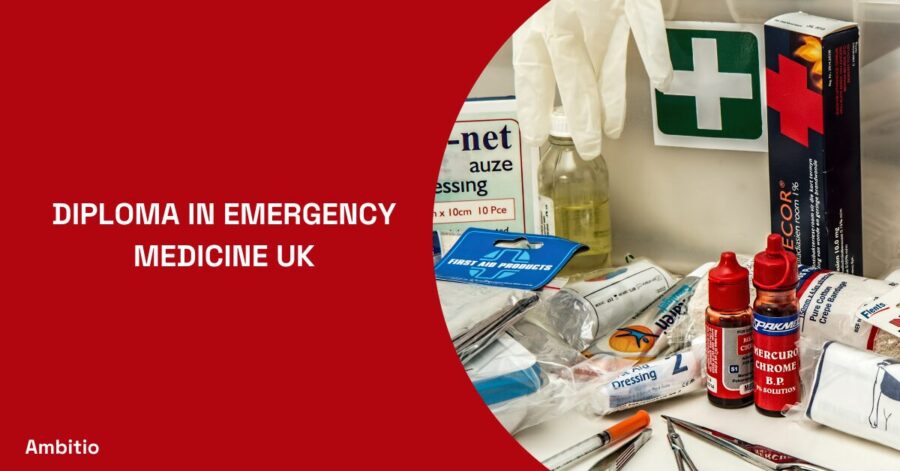14 December 2024
6 minutes read
Diploma in Emergency Medicine UK: Your Path to a Thriving Medical Career

Introduction
In the fast-paced world of healthcare, emergency medicine stands as a cornerstone. The need for highly skilled professionals in this field is ever-growing. If you’re interested in pursuing a career in emergency medicine in the UK, a Diploma in Emergency Medicine might be the perfect course for you. In this comprehensive guide, we’ll delve deep into the details of this program, its eligibility criteria, career prospects, and more.
What is a Diploma in Emergency Medicine?
A Diploma in Emergency Medicine in the UK is a comprehensive course designed to equip healthcare professionals with the necessary skills and knowledge to manage a wide range of medical emergencies. This program covers a broad spectrum of topics related to emergency care, from basic first aid to advanced clinical practices.
Why Choose Emergency Medicine Training in the UK?
Emergency medicine training in the UK is highly regarded worldwide. The country boasts a robust healthcare industry and a well-regulated system, making it an ideal place to gain expertise in this field.
The Royal College of Emergency Medicine (RCEM) plays a pivotal role in setting standards and offering valuable resources for aspiring emergency medicine professionals.
Course Overview
A Diploma in Emergency Medicine in the UK is an intensive and comprehensive program that equips healthcare professionals with the knowledge, skills, and practical experience required to excel in the field of emergency medicine. This section provides an in-depth exploration of the key components and subjects covered in this program.
1. Clinical Practice:
Central to the course is hands-on clinical practice, where students are immersed in the real-life challenges and scenarios faced in emergency departments. This component allows students to apply their theoretical knowledge to actual patient care, under the supervision of experienced medical practitioners.
During clinical practice, students learn to assess and manage a wide range of medical emergencies, including trauma cases, cardiac events, respiratory distress, and more. They gain proficiency in conducting thorough medical evaluations, making critical decisions, and delivering timely interventions to stabilize patients.
2. Emergency Care:
Emergency care is a fundamental pillar of the program, encompassing various aspects of immediate medical attention. Students delve into the techniques and protocols for resuscitation, advanced life support, and critical care. They become proficient in performing life-saving procedures, such as CPR (Cardiopulmonary Resuscitation), defibrillation, and airway management.
Moreover, students are trained to deal with diverse medical conditions, from injuries resulting from accidents and falls to acute illnesses and complications. The emphasis on emergency care ensures that graduates are well-prepared to handle any medical crisis with competence and confidence.
3. Paediatric Emergency Medicine:
Children require specialized care in emergency situations, and this program recognizes the unique needs of pediatric patients. Students receive specialized training in managing emergencies involving infants and children, such as pediatric trauma, respiratory distress, and infectious diseases.
Pediatric emergency medicine covers not only the medical aspects but also addresses the psychological and emotional needs of young patients and their families. Graduates are equipped to provide compassionate and effective care to this vulnerable age group.
4. Pre-Hospital Emergency Medicine:
Pre-hospital emergency medicine is a critical component of the program, focusing on delivering care in pre-hospital settings, including ambulances, accident scenes, and other out-of-hospital environments. Students learn to work as part of a team in high-pressure situations, where timely and effective interventions can make a life-saving difference.
This aspect of the program emphasizes the importance of triage, rapid assessment, and the initial stabilization of patients before they reach the hospital. It trains students to work seamlessly with paramedics, EMTs (Emergency Medical Technicians), and other first responders.
5. Certification:
Upon successful completion of the Diploma in Emergency Medicine program, graduates receive a prestigious certification recognized by healthcare institutions and employers across the UK. This certification serves as tangible evidence of their expertise in emergency medicine.
The diploma certificate not only validates their knowledge and skills but also opens doors to a multitude of career opportunities within the healthcare industry. Graduates are well-positioned to pursue roles in emergency departments, pre-hospital care, specialized clinics, and more.
In addition to the core components mentioned above, the program often includes modules on advanced topics such as infectious diseases, sexual health emergencies, and the management of life-threatening conditions specific to different age groups. This well-rounded curriculum ensures that graduates are prepared to handle the diverse challenges that arise in emergency medicine.
Eligibility Criteria
To enroll in a Diploma in Emergency Medicine program in the UK, you typically need to meet certain criteria, which may include:
1. Medical Degree or Relevant Healthcare Qualification:
- Most programs require applicants to hold a medical degree or a relevant healthcare qualification. This ensures that students have a foundational understanding of healthcare practices.
2. Evidence of Achievement in Previous Studies:
- Institutions may require applicants to provide evidence of their academic achievements, such as transcripts and certificates from previous educational institutions.
3. Basic Life Support (BLS) Certification:
- Many programs require applicants to hold a valid Basic Life Support (BLS) certification, demonstrating their knowledge of life-saving techniques.
4. Medical Work Experience:
- While requirements vary by institution, having prior medical work experience can be advantageous in the application process.
It’s essential to check the specific eligibility requirements of the program you’re interested in.
Career Prospects
Completing a Diploma in Emergency Medicine in the UK opens up a wide array of promising career opportunities in the dynamic and ever-evolving field of emergency medicine.
Graduates of this program are highly sought after by healthcare institutions, both within the UK and internationally, due to their specialized training and expertise. Below, we explore the diverse career paths available to diploma holders:
1. Emergency Medicine Consultants:
Emergency Medicine Consultants are highly experienced professionals who play a pivotal role in leading and managing emergency departments (EDs) in hospitals.
They are responsible for overseeing the entire emergency care process, ensuring the delivery of high-quality care to patients. Consultants often engage in clinical research, teaching, and continuous quality improvement within the ED.
2. Paramedics:
Paramedics are essential first responders who provide critical care and medical assistance in the pre-hospital setting. They are often the first healthcare professionals on the scene of an accident or medical emergency.
Paramedics assess patients, administer life-saving interventions, and transport them to appropriate healthcare facilities. Diploma holders with a focus on pre-hospital emergency medicine are well-suited for this role.
3. Emergency Department Practitioners:
Emergency Department Practitioners are healthcare professionals who specialize in delivering emergency care within hospital EDs. They work alongside physicians and nurses to assess, diagnose, and treat patients with a wide range of medical conditions. Their role is crucial in ensuring that patients receive prompt and effective care.
4. Clinical Fellows:
Clinical Fellows are medical professionals who engage in further training and research within the field of emergency medicine. They often work in academic medical centers and contribute to advancements in emergency care through research, publications, and hands-on clinical experience.
5. Pre-Hospital Care Practitioners:
Pre-Hospital Care Practitioners, including Emergency Medical Technicians (EMTs), work in ambulances and other pre-hospital settings. They respond to emergency calls, administer medical treatments, and provide stabilization for patients before they reach the hospital. Graduates with expertise in pre-hospital emergency medicine are well-prepared for this vital role.
6. Speciality Trainees:
Speciality Trainees are medical professionals who undergo specialized training in emergency medicine as part of their career development. This structured training program typically leads to certification as a specialist in emergency medicine. Trainees gain exposure to a wide range of cases, honing their skills and knowledge in preparation for advanced roles.
7. General Practitioners with a Focus on Urgent Care:
General Practitioners (GPs) with a focus on urgent care specialize in providing immediate healthcare services to patients with acute medical needs. They often work in urgent care centers or walk-in clinics, offering a bridge between primary care and emergency care. Diploma holders with this focus can make a significant impact on improving access to timely medical attention.
8. Research and Academia:
Some graduates of the Diploma in Emergency Medicine program choose to pursue careers in research and academia. They may work in universities or research institutions, conducting studies related to emergency medicine, patient outcomes, and healthcare systems. Their research contributes valuable insights to the field and informs evidence-based practices.
9. International Opportunities:
The skills and knowledge acquired through a UK-based Diploma in Emergency Medicine are highly transferable, opening doors to international career opportunities. Many countries seek trained emergency medicine professionals to strengthen their healthcare systems and respond to emergencies.
10. Hospital Administration:
Professionals with a background in emergency medicine are also well-suited for roles in hospital administration. Their clinical experience and understanding of emergency care protocols make them valuable assets in managing and optimizing ED operations.
Conclusion
In conclusion, a Diploma in Emergency Medicine in the UK can be your gateway to a rewarding and fulfilling career in the healthcare industry. With a strong curriculum, a focus on practical skills, and the prestige of UK-based training, it’s an excellent choice for those who want to make a difference in the lives of patients in critical situations.
Whether you’re a recent medical graduate or a healthcare professional looking to specialize, this program offers a pathway to success in the dynamic field of emergency medicine.
Frequently Asked Questions (FAQs)
Q1. What is the Duration of a Diploma in Emergency Medicine Program in the UK?
The duration varies but typically ranges from 6 months to 2 years, depending on the level of qualification.
Q2. Is There an Age Limit for Enrolling in This Program?
Most programs do not have a strict age limit, but applicants are required to meet the eligibility criteria.
Q3. Can Non-Medical Graduates Apply for This Course?
In most cases, non-medical graduates may not be eligible. However, some programs may accept applicants with relevant healthcare qualifications.
Q4. Are There Online Learning Options Available for This Course?
Yes, many institutions offer online learning options, making it more accessible to a broader range of students.
Q5. What Are the Career Prospects for Graduates of This Program?
Graduates can work in various roles within the emergency medicine field, from consultants to paramedics, and in both pre-hospital and clinical settings.
Q6. Are There Any Prerequisite Courses or Skills Needed Before Enrolling in a Diploma in Emergency Medicine Program?
While specific prerequisites may vary by program, having a solid foundation in basic life support (BLS) and a medical background can be advantageous.
Q7. How Does the Diploma in Emergency Medicine Contribute to the Healthcare Industry?
The program equips graduates with the knowledge and skills necessary to respond to medical emergencies efficiently, thus contributing to saving lives and improving patient outcomes in the healthcare industry.

You can study at top universities worldwide!
Get expert tips and tricks to get into top universities with a free expert session.
Book Your Free 30-Minute Session Now! Book a call now




























